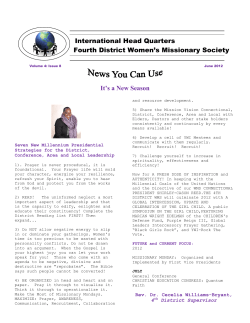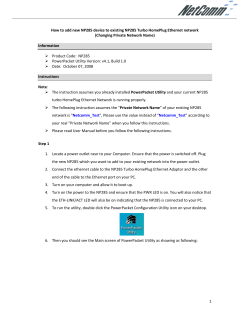
Why Stormwater Utilities Succeed and Fail: A “Top Ten” List
Why Stormwater Utilities Succeed and Fail: A “Top Ten” List “Paying for Municipal Stormwater Programs: Confronting Challenges, Recognizing Opportunities and Building Community Consensus” The Hugh Gregg Coastal Conservation Center, Greenland, NH October 18, 2012 AMEC Environment & Infrastructure, Inc. Rich Niles, Water Resources Project Manager Overview . . . National Perspective Stormwater Utilities in New England Misconceptions of Failure and Success A Framework for Success – Utility or Not Overcoming Hurdles Addressing the “Public” Factor © 2012 AMEC, all rights reserved 2 Existing Stormwater Utilities Source: Stormwater Utility Survey 2012, Figure 1, Warren Campbell, Western Kentucky University © 2012 AMEC, all rights reserved 3 Stormwater Utilities by Year Hurricane Andrew & Midwest flooding © 2012 AMEC, all rights reserved Source: Stormwater Utility Survey 2010, Figure 7, Warren Campbell, Western Kentucky University NPDES Phase II Rule 4 New England Utility Established Implementation Underway Feasibility Study © 2012 AMEC, all rights reserved 5 © 2012 AMEC, all rights reserved Bristol, RI Cranston, RI Westerly, RI Middletown, RI New London, CT Stonington, CT New Haven, CT Norwalk, CT Salem, MA Northampton, MA Auburn, MA Yarmouth, MA Bellingham, MA Ayer, MA Franklin, MA Milford, MA Fall River, MA Gloucester, MA Chicopee, MA Westfield, MA Reading, MA Newton, MA 100,000 South Burlington, VT Burlington, VT 120,000 Nashua, NH Franklin, NH Portsmouth, NH Dover, NH Portland, ME Manchester, NH Bangor, ME Augusta, ME Orono, ME Wells, ME Lewiston, ME Kittery, ME York, ME South Berwick, ME Elliot, ME Berwick, ME New England SW Utilities & Studies Population (2010 census) 140,000 Utility Established Implementation Underway Feasibility or Other Study 80,000 60,000 40,000 20,000 0 6 Small New England Communities Populations <20,000 (2010 census) 20,000 18,000 Utility Established 16,000 Implementation Underway 14,000 Feasibility or Other Study 12,000 10,000 8,000 6,000 National Statistics* Avg. Population = 79,000 Median Population = 20,000 Smallest = 33 Indian Creek Village, FL 4,000 2,000 *Source: Stormwater Utility Survey 2010, Warren Campbell, Western Kentucky University 0 © 2012 AMEC, all rights reserved 7 AMEC Stormwater Funding Experience . . . and Lessons Learned © 2012 AMEC, all rights reserved 8 Defining What Appears to be “Failure” What failure is not: Not going forward with the utility Not achieving a mature program in the first few years – but knowing the program path Not having 100% approval or a unanimous vote © 2012 AMEC, all rights reserved What failure is: Having an uncontrolled and unplanned crash Not being able to meet the expectations you created (not a program driven rate) Having a generally ignorant or unsupportive public and stakeholders 9 Failure Mode #1: not getting off the ground…badly The passengers seem nervous Ok we better head back to the gate The Stormwater Utility Express © 2012 AMEC, all rights reserved 10 Failure Mode #2: flying…badly You bet Cap’n what’s so hard about this anyway? Hey we’re off and its smooth flying- isn’t it grand? 11 Top 10 Reasons for “Failure” . . . 1. 2. 3. 4. 5. 6. 7. 8. We did it the convenient and inexpensive way. We didn’t make a true compelling case. We didn’t understand the process. It was not legal. We didn’t involve the public early enough or in the right ways. Couldn’t explain our program and funding strategy or rates. Didn’t prepare our elected officials for vocal complaints. Our revenue and rate structure limited our ability to do our program. 9. Our database was messed up without ability to easily fix. 10. Our program or performance did not meet community expectations. © 2012 AMEC, all rights reserved 12 10. Our program or performance did not meet community expectations The revenue comes pretty fast when you’re used to a trickle!! © 2012 AMEC, all rights reserved 13 9. Our database was messed up without ability to easily fix $1.2 M recovery Retroactive, inaccurate billing with little recourse for help. © 2012 AMEC, all rights reserved 14 8. Our revenue and rate structure limited our ability to do our program Indiana city lost 48% of its revenue through capping commercial – thus its program lost public confidence and support after four years. Other Residential Lost Revenue Commercial © 2012 AMEC, all rights reserved 15 7. Didn’t prepare our elected officials for vocal complaints. Political Leaders: Do not want to “fall on the knife” for stormwater Need to be given good answers and accurate information If not…they might eject and leave you to crash. © 2012 AMEC, all rights reserved 16 6. Couldn’t explain our program and funding strategy or rates It was so complex even the consultant could not explain it publicly © 2012 AMEC, all rights reserved The “Rube Goldberg” rate structure: four pollutants + multiple credits + three surcharges + little actual data = one big failure 17 5. We didn’t involve the public early enough or in the right ways The Two Basic Rules of Stormwater Survival: Bring me in early I’m your partner. Bring me in late I’m your judge. Insert a group of citizens between yourself and every hard decision you must make. © 2012 AMEC, all rights reserved 18 Never underestimate the ability of political leaders to get it wrong or . . . . © 2012 AMEC, all rights reserved 19 …the media to send a wrong message to the public …or © 2012 AMEC, all rights reserved 20 …your “supporters” to have second thoughts © 2012 AMEC, all rights reserved 21 No surprises !! Public Information Plan • Who is the public ? • What is the message ? • When is the message ? • How is the message sent ? • Emergency response 22 4. It was not legal © 2012 AMEC, all rights reserved 23 3. We didn’t understand the process Five key areas: 1. 2. 3. 4. 5. Governance and inter-municipal consensus Program concept and the compelling case Public and political education and support Financial policies and documents Database development & accuracy and customer service © 2012 AMEC, all rights reserved A matter of “due diligence” and knowing that stormwater is not wastewater 24 © 2012 AMEC, all rights reserved 25 2. We didn’t make a true compelling case There are lots of drivers for action … but are they compelling? © 2012 AMEC, all rights reserved 26 1. We did it the convenient and inexpensive way Even a beginner skier… makes it down the black diamond slope sometimes… but the risks are great… the odds are poor… and the result of a fall is very bad. © 2012 AMEC, all rights reserved 27 Don’t try this at home !! 28 Success or Failure – It’s All in the Process . . . 6 Follow an effective process and get good advice. 6 Involve the community early enough and in the right ways – GET PUBLIC SUPPORT. 6 Make your program and user fee easy to understand. 6 Prepare your elected officials for negative feedback – give them solutions. 6 Think of the long-term benefits and recognize the pain is worth the gain. 6 Spend the money it takes – you get what you pay for. © 2012 AMEC, all rights reserved 29 The Other List . . . 1. 2. 3. 4. 5. 6. We did it the right way – we followed due diligence in all aspects. We made a strong compelling case. We followed a carefully laid out process. It was legal and well documented. We involved the community early enough and in the right ways. Our program and funding strategy and rates were simple and rational. 7. Our elected officials were supportive and knowledgeable in answering complaints. 8. Our revenue and rate structure fully supported our agreed to program plan. 9. Our database was nearly flawless and our customer service effective. 10. Our program or performance met community expectations. © 2012 AMEC, all rights reserved 30 Questions and Comments? Rich Niles rich.niles@amec.com 978-392-5355 Direct 2 Robbins Road Westford, MA 01886 These slides are copyright protected and cannot be duplicated without the express and written permission of AMEC. © 2012 AMEC, all rights reserved 31
© Copyright 2025












